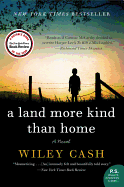
Since its initial publication in April 2012, Wiley Cash's debut novel, A Land More Kind Than Home, has garnered widespread critical acclaim and won the prestigious Crime Writer's Association (CWA) "New Blood" Dagger Award. From its very first pages, it is clear why this haunting and deeply resonant novel has struck such a chord with readers. Combining suspense and domestic drama with an effortless narrative, A Land More Kind Than Home is one of those stories that seeps in under the skin, its characters and powerful sense of place lingering long after the last page.
Set in the 1980s in Marshall, a small town in western North Carolina, the novel is narrated in the alternating voices of three characters: Adelaide Lyle, the elderly town midwife; Jess Hall, a sensitive and inquisitive nine-year-old boy; and Clem Barefield, the town's middle-aged sheriff, who has never fully recovered from a tragedy in his past. Together, these three voices fill in the links of a tragic chain of events as it unfolds in real time while also providing context and depth in flashbacks to times ranging from days to decades earlier. Adelaide, the first character to speak, sets the novel's quiet, ominous tone. Things are not the same in Marshall as they were 10 or 15 years ago, she muses. In those simpler times, the community was drawn together and strengthened by their church. But when the pastor died, he was replaced by out-of-towner Carson Chambliss, who moved the church, papered its windows so that nobody could see inside, and practices the handling of snakes and drinking of poisons in the name of faith. Adelaide remembers vividly an incident years earlier when Molly Jameson, an elderly parishioner, was bitten by one of those snakes after lifting it to her face. Days later, Molly Jameson's dead body was found dumped in her own flower bed. It was then that Adelaide decided to take the children into her own home on Sundays during services. But now, Adelaide tells us, something bad has happened again in that church and she suspects things are going to get still worse.
The bad things going on in the church concern "Stump," Jess Hall's mute and developmentally delayed 13-year-old brother. After being sent outside by their mother Julie to find salamanders, Jess and Stump decide to spy on her. Peeping into their house from the rain gutter, they witness something they shouldn't--something that will set a terrible series of events in motion. But Jess cannot reveal that he and his brother had been spying so he says nothing when his mother takes Stump to church to be "healed" by Pastor Chambliss. Nor can he do anything to stop the death of his brother shortly thereafter. When Sheriff Barefield is called in to investigate Stump's death, it brings back awful memories of losing his own son. Jimmy Hall, Jess's alcoholic and violent grandfather, who has coincidentally just reappeared in town, was involved, though not directly responsible. The sheriff must come to terms with Jimmy and his own loss before he can resolve the tragedy at hand.
Although we know not only what happened, but also have a good sense of why early in the novel, Cash manages to keep the suspense taut and building throughout. As seen through the eyes of all three narrators, Carson Chambliss becomes one of the creepiest and most frightening villains in modern fiction. One scene in particular, where the sheriff questions Chambliss in the pastor's darkened barn while hundreds of empty snakeskins hiss in the breeze, demonstrates Cash's ability to create a sense of the sinister, the banality of evil and the power of misguided faith to twist and warp the human spirit. It is both terrifying and beautiful. Similar scenes are repeated throughout this accomplished novel.
Cash's attention to the minute details of North Carolina cadences and physical geography contribute to the layered emotional landscape he creates for his characters. As the novel moves toward its startling but redemptive conclusion, it raises questions about the complicated nature of faith, family and what constitutes real forgiveness. It is to Cash's credit--and what makes this novel such an excellent one--that he manages to make it all so easy for the reader. A Land More Kind Than Home is, above all, a great read; a beautifully written and transporting story. --Debra Ginsberg, author

